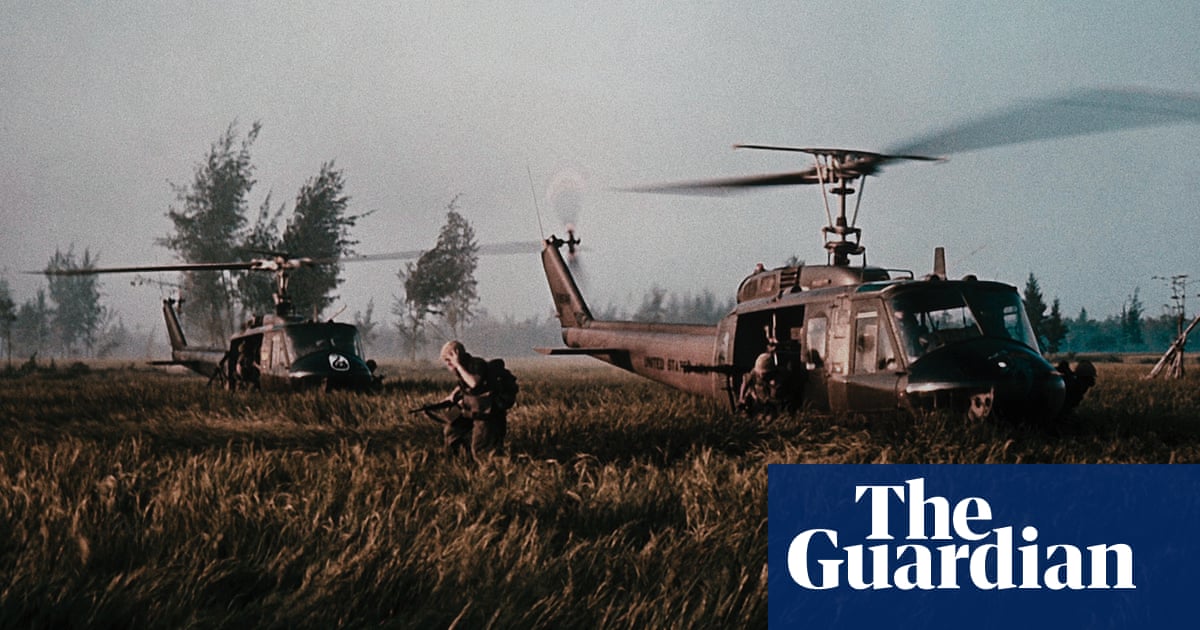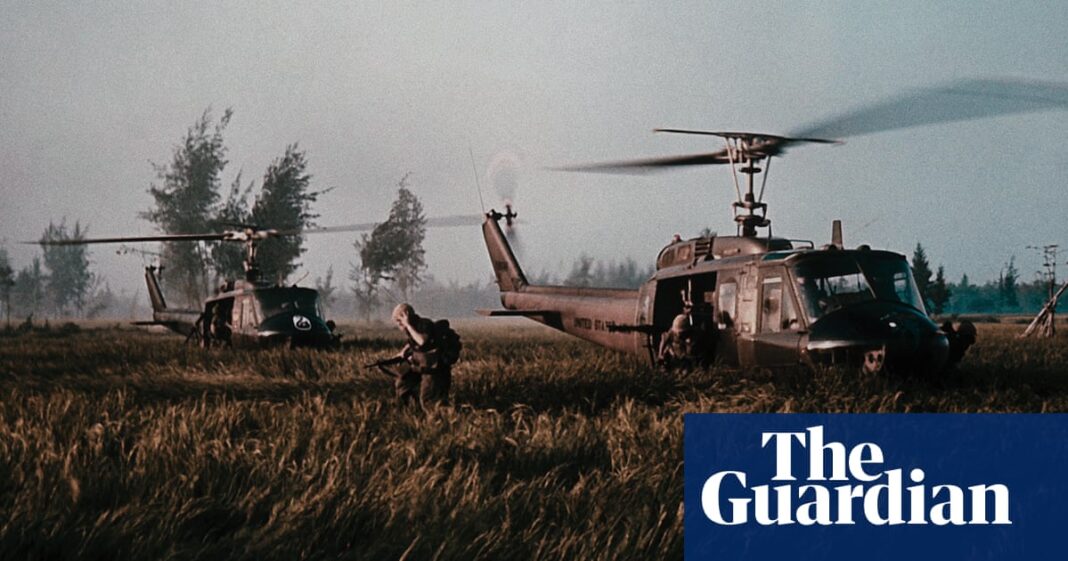“Fifty years have passed since the fall of Saigon, yet the scars of the Vietnam war remain a poignant reminder of the devastating consequences of conflict. A newly released docuseries, ‘The Last Patrol’, revisits the brutal and bloody conflict that ravaged the country, leaving an estimated 3 million people dead and countless more displaced. The series, produced by filmmakers who lived through the war, offers a deeply personal and unflinching look at the human cost of war, exposing the darkest corners of the conflict and the lasting impact it has had on those who survived. Through first-hand accounts, archival footage, and intimate interviews with veterans and civilians, ‘The Last Patrol’ is a powerful reminder of the enduring legacy of the Vietnam war, and the ‘open wound’ it has left on the hearts and minds of those who lived through it.”
The Deeply Conflicting Histories of Vietnam and the US

As outlined in Turning Point: The Vietnam War, a sweeping new Netflix series on the conflict and its long, dark shadow, the war left an indelible mark on the American psyche that is still festering today.
The historian and writer Viet Thanh Nguyen notes, “There’s history in the sense of facts. But there’s also history as stories, as narratives.” Nguyen’s acclaimed 2015 novel The Sympathizer, which traces a North Vietnamese mole’s mutable loyalties over many years, opens during the cataclysmic – or, depending on who you talk to, triumphant – fall of Saigon; as a South Vietnamese refugee in the US, Nguyen says, he was aware how “in both of these countries, there are deeply conflicting histories. That’s part of what led to the war in Vietnam.”
The Lionization of Ho Chi Minh and the Binary of Communism vs Democracy
In five roughly 80-minute chapters, Knappenberger’s series delves into those histories, layering subjective narrative – among them, the steadfast binary of communism v democracy that undergirded US involvement and the lionization of Ho Chi Minh in the North – over a clear timeline of events.
The US Involvement and the Guise of “Advising” in South Vietnam
The conflict in Vietnam marked not just a sea change in America’s role on the world stage, but in how war was documented. The series relies extensively on archival footage from CBS, one of the pre-eminent US journalism outlets on the ground in Vietnam, whose reporters were responsible for some of the largest breaks with the US military’s party line.
US involvement in South Vietnam began under the guise of “advising” their military against real and perceived communist encroachment from the north, initiated by John F Kennedy, who escalated US military involvement in South Vietnam.
The Chronological Coverage of Four US Presidential Administrations
The series proceeds chronologically, covering four US presidential administrations starting with John F Kennedy, who initially escalated US military involvement in South Vietnam under the guise of “advising” their military against real and perceived communist encroachment from the north.
The conflict in Vietnam marked not just a sea change in America’s role on the world stage, but in how war was documented. The series relies extensively on archival footage from CBS, one of the pre-eminent US journalism outlets on the ground in Vietnam, whose reporters were responsible for some of the largest breaks with the US military’s party line.
The Escalation of US Military Involvement in South Vietnam
The series relies extensively on archival footage from CBS, one of the pre-eminent US journalism outlets on the ground in Vietnam, whose reporters were responsible for some of the largest breaks with the US military’s party line.
From interviews with US grunts openly questioning why they’re fighting, to graphic images of women and children massacred by US soldiers at My La Stage Search Party’s John Early: ‘You can only take a narcissistic monster for so long – it grates after 10 years’ ‘Bombs and bullets were like rain’: 50 years on from the fall of Saigon and the end of the Vietnam war Apr 29 2025 13.39 EDT
The Power of Archival Footage
The Extensive Use of CBS Archival Footage: Bringing Reality Closer
The series relies extensively on archival footage from CBS, one of the pre-eminent US journalism outlets on the ground in Vietnam, whose reporters were responsible for some of the largest breaks with the US military’s party line.
The Graphic Images of Massacres and Questioning Soldiers
From interviews with US grunts openly questioning why they’re fighting, to graphic images of women and children massacred by US soldiers at My La Stage Search Party’s John Early: ‘You can only take a narcissistic monster for so long – it grates after 10 years’ ‘Bombs and bullets were like rain’: 50 years on from the fall of Saigon and the end of the Vietnam war Apr 29 2025 13.39 EDT
The Shocking Reality of War and Its Impact on Viewers
For viewers now and then, the footage “brings us much closer to the reality of what’s happening in a way that people found very, very shocking”, said Knappenberger.
Implications and Legacy of the Vietnam War
The War’s Indelible Mark on the American Psyche
The America that existed before the United States engaged militarily in Vietnam was a radically different country than the America that emerged after our troops came home,” said the director Brian Knappenberger. “That new America that emerged from this conflict contained the roots of a lot of what plagues our society today – widespread alienation, deep cynicism, profound distrust in government, a breakdown of our civic institutions.”
The Roots of Widespread Alienation and Deep Cynicism in Society Today
Cynicism emerged largely from the yawning disconnect between what the government under John F Kennedy, Lyndon Johnson, Richard Nixon and Gerald Ford said was happening, and what Americans learned was happening through the news, the experience of their loved ones, or the absence of loves ones who never returned home.
The Legacy of Distrust in Government and Civic Institutions
The cynicism emerged largely from the yawning disconnect between what the government under John F Kennedy, Lyndon Johnson, Richard Nixon and Gerald Ford said was happening, and what Americans learned was happening through the news, the experience of their loved ones, or the absence of loves ones who never returned home.
Conclusion
The recent docuseries revisiting the Vietnam War 50 years on is a poignant reminder of the devastating consequences of military conflicts and the lasting impact on those who lived through it. The series, as described in The Guardian, sheds light on the brutal realities of war, exposing the human cost of the conflict and the enduring trauma suffered by veterans and civilians alike.
The docuseries highlights the ongoing struggles of veterans, who continue to grapple with the psychological and physical scars of war, and the difficulties faced by civilians who were displaced, injured, or lost loved ones. The series also underscores the importance of preserving historical records and stories, ensuring that the experiences of those who lived through the war are not forgotten or silenced.
As we reflect on the Vietnam War’s 50-year anniversary, it is crucial to acknowledge the significance of this conflict and its lasting impact on global politics, international relations, and individual lives. The docuseries serves as a powerful reminder of the importance of understanding and learning from the past, in order to prevent similar conflicts from occurring in the future. As we move forward, it is essential that we continue to prioritize truth-telling, accountability, and reconciliation, in order to heal the wounds of war and promote a more just and peaceful world. Ultimately, the Vietnam War serves as a poignant reminder that the human cost of war is always the most devastating – and that our collective responsibility is to work towards a future where such conflicts are a thing of the past.
